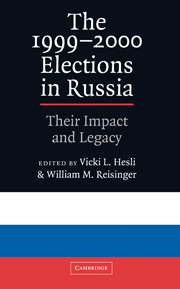Book contents
- Frontmatter
- Contents
- Contributors
- Acknowledgment
- SECTION I INTRODUCTION
- 1 Parliamentary and Presidential Elections in Russia: The Political Landscape in 1999 and 2000
- SECTION II PARTIES IN THE ELECTORATE
- SECTION III THE ROLE OF REGIONAL POWER
- SECTION IV PARTIES AND INSTITUTIONS
- SECTION V CONCLUSION
- Bibliography
- Index
1 - Parliamentary and Presidential Elections in Russia: The Political Landscape in 1999 and 2000
Published online by Cambridge University Press: 23 October 2009
- Frontmatter
- Contents
- Contributors
- Acknowledgment
- SECTION I INTRODUCTION
- 1 Parliamentary and Presidential Elections in Russia: The Political Landscape in 1999 and 2000
- SECTION II PARTIES IN THE ELECTORATE
- SECTION III THE ROLE OF REGIONAL POWER
- SECTION IV PARTIES AND INSTITUTIONS
- SECTION V CONCLUSION
- Bibliography
- Index
Summary
The chapters in this book have been written in response to a question about what the effects of the 1999 parliamentary elections and the 2000 presidential election have been on the evolution of political institutions and democratic government in the Russian Federation. The sitting of the 1999 parliament and the inauguration of President Vladimir Putin marked the completion in Russia of three competitive rounds of presidential elections (1991, 1996, and 2000) and three cycles of parliamentary elections (1993, 1995, and 1999). In the aftermath of each of the previous electoral cycles, scholars have interpreted, analyzed, and judged the development of presidentialism, parliamentary government, political parties, public opinion, and national integration. In a sense, scholars have been keeping a running theoretical and empirical tally of Russia's progress through the epic challenges of democratic consolidation in the world's territorially largest state. This book continues that evaluative and prescriptive process as we watch the institutional structures and the political landscape of the Russian Federation begin to stabilize into a form that is partly uniquely Russian but also representative of political processes characteristic of industrialized countries more broadly.
Early studies of Russia's democratization process tended to be either reserved or negative in their assessments and conclusions. Russian democracy was described as “electoralist,” “formal,” and “unconsolidated” (Linz and Stepan 1996; Grey 1997; Remington 1997; Sorensen 1998). This was contrasted with more positive assessments of democratic consolidation in other post-Communist regimes, such as in Hungary or Poland.
- Type
- Chapter
- Information
- The 1999–2000 Elections in RussiaTheir Impact and Legacy, pp. 3 - 26Publisher: Cambridge University PressPrint publication year: 2003
- 2
- Cited by

